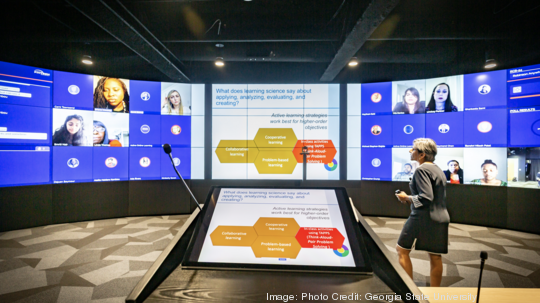
Solving today's complex business challenges requires diversity in background, perspectives, and skill sets—and the next breakthrough idea could come from the most unexpected person.
Take Kennedy Crandell, for example. She built a prototype for an app that connects artists and entertainers in Atlanta with employment opportunities. Less than a year ago, Crandell was employed as a social worker and would have never imagined this type of work was possible—that is, until she left the industry to pursue a career in data science. Her first step? Enrolling in the Graduate Certificate Program in Artificial Intelligence Business Innovation at Georgia State University's Robinson College of Business.
Despite no previous programming experience, Crandell quickly picked up valuable skills like Python, predictive models, and linear regression.
"At first, I had no idea how I was going to go about developing a prototype, but after I made the first one, I thought, ‘Wow, this is attainable,’" said Crandell.
The knowledge was so accessible that Crandell has since gone on to enroll in Robinson’s M.S. in Data Science and Analytics.
Flexible graduate certificates programs on the rise
Flexible graduate certificate programs are gaining popularity to help students like Crandell who are hungry for relevant, skills-based learning.
At Robinson, for example, you can enroll in four-course, two-semester certificates in Artificial Intelligence Business Innovation, Disruptive Innovation and Entrepreneurship, and Fintech Innovation. Better yet, these programs require less time and money than a full-blown degree—and, should you decide to take your certificate even further, the credits can be applied upon admission toward the MBA program as well as select master’s degrees, like Data Science and Analytics. Students who go this route are already 40% of the way toward the required credit hours for their degree.
Quenching market demand
To meet current and emerging market demand, universities collaborate with corporations to design graduate certificate coursework. At Robinson, faculty teamed up with partners including Anthem, AT&T and The Coca-Cola Company to develop the most relevant, hands-on curriculum.
But don't just take my word for it:
• The U.S. Bureau of Labor Statistics projected the addition of 5,460,000 jobs in data-related occupations by 2021, representing 12% growth in the industry.
• User experience professionals, data science specialists, and artificial intelligence practitioners are among LinkedIn's “Jobs on the Rise”, a list of the 15 most in-demand jobs for 2021.
• The Metro Atlanta Chamber predicted Georgia will add 2,000 new fintech jobs annually through 2023.
• The World Economic Forum’s “Future of Jobs” report projects the top 15 skills rising in prominence through 2025 include analytical thinking, innovation, complex problem solving, and leadership and social intelligence.
Opportunity abounds. And while you might think you don't have the experience to dive in, graduate certificates make it possible to gain new skills—quickly and affordably.
You don't need to be a data scientist to work in data
New pathways are rapidly democratizing the data science field, giving rise to the emerging skill set of citizen data scientist. This term describes someone who may not have extensive programming skills but with the right tools can use advanced technologies to create value and realize the potential of artificial intelligence.
Whether you want to start a new career or your company is shifting to more data-driven practices, you can pursue a graduate certificate in artificial intelligence to capitalize on the need for this emerging skill set. That's precisely what Carla Vasquez did when she enrolled in Robinson College's artificial intelligence business innovation certificate program. Vasquez is a talent scout for State Farm Insurance who wanted to increase her digital acumen to make data-backed hiring and retention decisions.
"It's been really helpful to learn how to articulate the data behind my decisions and recommendations," she said. "Through the Predictive Analytics course during my first semester, I explored different ways to analyze data and to account for things like misspellings and incomplete information."
Not only did Vasquez learn new methods each week, but she also flexed her creative muscles in the Innovation Studio, a required first-semester course in each one of Robinson’s graduate certificate programs. The Innovation Studio provides an experimental and collaborative environment where students leverage design thinking frameworks, and build critical thinking, emotional intelligence, social influence, and communication skills.
"I love that about the Innovation Studio," Vasquez said. "You get exposed to all these different individuals and leverage their experience as a support group and knowledge base."
Embracing new possibilities
Crandell and Vasquez are just two examples of professionals pushing boundaries and embracing the new possibilities of today's business landscape. And they are not alone. Are you ready to join them? Learn more about enrolling in Robinson’s flexible graduate certificate programs this fall and read other inspiring student stories at www.robinson.gsu.edu.
Georgia State University's J. Mack Robinson College of Business is among the top 10 largest accredited business colleges by graduate enrollment, according to the Association to Advance Collegiate Schools of Business (AACSB). According to data from Standard & Poor's, more Georgia executives hold advanced degrees from the Robinson College of Business and Georgia State University than any other U.S. institution.
Brian Jennings is the Associate Dean for Graduate Programs and Executive Education at the J. Mack Robinson College of Business. He has a deep understanding of the graduate management education landscape, with nearly 16 years spent developing MBA, executive education, non-degree programs and corporate, academic partnerships. He also spent 18 years in the technology consulting industry.